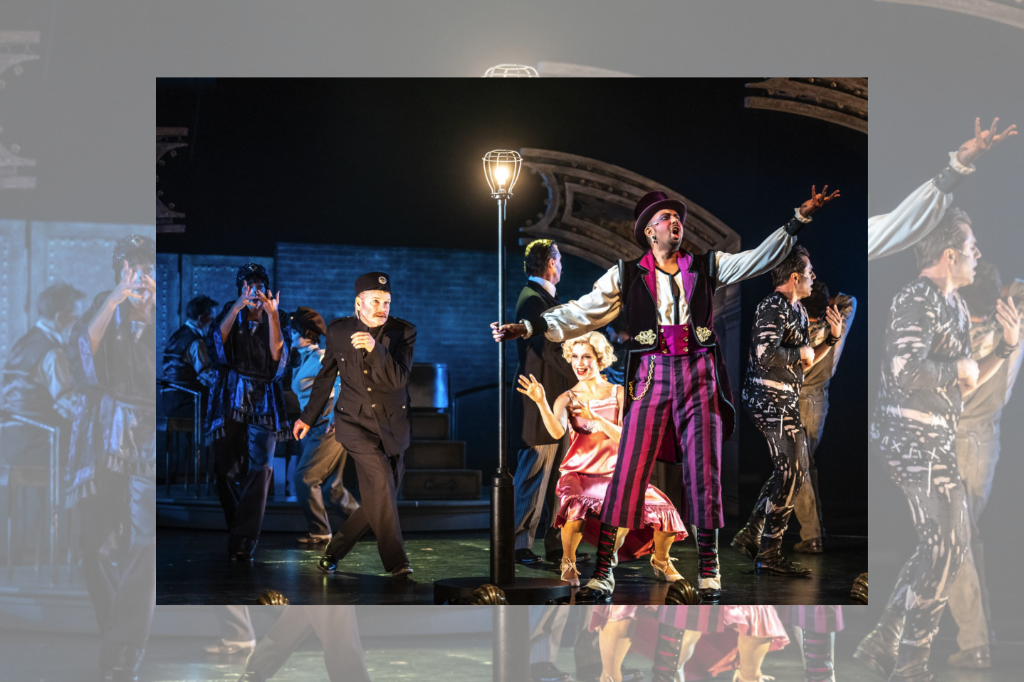REVIEW: Grand Ghosts at The Grand Theatre
The following is a collective review written by the students of Reviewing Performance at Western University under the instruction of Professor Taylor Marie Graham.
Taylor Marie Graham, Professor
What you are about to read is a collective review of Grand Ghosts at the Grand Theatre, written by ten Western University students in a fourth year theatre criticism class. Each student explores a different aspect of the play through their individual lens. The first two sections focus on historical context and summary, and then the review transitions to comments on performances, music, dance, entertainment value, and more.
Western University is located on the traditional territories of the Anishinaabek (Ah-nish-in-a-bek), Haudenosaunee (Ho-den-no-show-nee), Lūnaapéewak (Len-ahpay- wuk) and Chonnonton (Chun-ongk-ton) Nations, on lands connected with the London Township and Sombra Treaties of 1796 and the Dish with One Spoon Covenant Wampum. This land continues to be home to diverse Indigenous Peoples (First Nations, Métis and Inuit) whom we recognize as contemporary stewards of the land and vital contributors of our society.
Nathalie Bettger, Student
It’s helpful to understand that Grand Ghosts by Trina Davies is inspired by a haunting true story that originated in southwestern Ontario and became an international sensation. On December 2, 1919, (on what I hope was a dark and stormy night!), Ontario theatre magnate Ambrose Small – owner of the Grand Opera House in Toronto and the Grand Theatre in London – disappeared. The day after selling his holdings to Trans-Canada Theatres Limited, Ambrose’s wife, Theresa, deposited the $1.7 million dollar cheque and met Ambrose at the Grand Opera House with attorney E.W.M. Flock, who was the last person to see Small alive before he disappeared without a trace. His absence, however, was not reported for two weeks, as his wife Theresa was supposedly certain he was “in the hands of a designing woman” and feared the scandal that would arise.
Small had a reputation for being ruthless and lacking morals, and as a result he made many enemies during his life: cheating business associates, fixing horse races, and having “secret” trysts in his theatres. A reward of $50,000 was offered for locating Ambrose alive and $15,000 if dead, prompting erroneous reports of sightings and theories, none of which generated any answers. To this day what became of Ambrose Small is still a mystery, and it will likely remain unsolved forever.
Bailey Baas-Williams, Student
Grand Ghosts reaches back in time and fictionalizes this story of Ambrose Small through the clever use of a play-within-a-play. The production’s premise is that the Grand Theatre has a number of resident ghosts from tragedies in which performers died. Once a year, the ghosts band together to play out Small’s sensational story and investigate the mystery of his disappearance. The first half of the show follows the story leading up to Small’s vanishing, while the second half is dedicated to the investigation, and the audience gets to put on their own detective hats.
Because all the ghosts are performers who won’t let death get in the way of their spotlight, the play becomes a captivating musical told through the use of beautiful piano, dance, miming, and even a bit of magic. Hilarious, local-friendly inside jokes about London, paired with the underlying spookiness of a ghost story, ensure this mysterious and wacky show will be remembered by this region’s audiences for years to come.
Narine Titizian, Student
Director Jillian Keiley, playwright Katrina Davies, and the rest of the creative team have collaborated to create an exceptional variety of vaudeville-inspired vignettes throughout the two-hour production. These creative choices keep audiences of all ages engaged throughout the duration of the show, leaving them with an astounding theatre experience.
Grand Ghosts encompasses all of the enjoyable aspects of the vaudeville aesthetic, including the use of the famous vaudeville hook — which doesn’t fail to hook the audience in! Notably, the actors’ storytelling through miming provides the play’s biggest laughs, and a particular horse-race scene in the show was one the audience absolutely loved the night I attended.
Keiley’s spooky, entertaining production achieves all of the above while simultaneously challenging vaudeville’s racist history, particularly with a notably diverse cast.
Sloan Atkinson, Student
The vaudeville genre of performance originally contained minstrel (blackface) performers as a form of entertainment for white spectators. Canadian theatre companies, including the Grand Theatre, have worked tirelessly to distance themselves from this racist performance practice which, yes, at one time existed on their stages.
Unfortunately, there was a disturbing incident after a performance of Grand Ghosts when a guest artist was the victim of two racist incidents. In a post shared to social media, the theatre expressed their concern regarding these attacks, saying the guest artist has chosen not to take further action and the theatre stands by that decision.
Even though this production of Grand Ghosts does its best to confront the racist history of vaudeville by including a diverse cast, these recent incidents demonstrate a larger social culture of intolerance and prejudice that is yet to be removed entirely from our society today.
Brittney-Lee Lowey, Student
As an emerging theatre practitioner myself who is always ready to learn from talented performers, I was particularly excited by two standout actors in Grand Ghosts. The first was Jesse Gervais, who plays the Grand Ghost himself, Ambrose Small. Through his versatility, magnetic stage presence and a keen sense of comedic timing (comparable in my opinion to comedy legend Will Ferrell), Gervais brings the wealthy theatre magnate back to life. The other standout, Andrew Prashad, plays the Emcee with a fun and lively energy. His tap dancing skills dazzle and reminded me why tap was so popular to audiences long ago. Not only were Gervais and Prashad captivating on the stage, but also off, as the social media campaigns surrounding them highlighted just how fun of a show this was to put together.
For me, both Gervais’ and Prashad’s performances were mini masterclasses in acting, and both taught me a thing or two in how to keep an audience on its toes.
Eden Eidt, Student
Grand Ghosts demonstrates it still has room to find the balance between upholding the tradition of using the superficial caricatures of vaudeville — the “ingenue,” the tomboy-ish “bookie,” the “diva,” and the “dramatic actress” — with adapting these female stereotypes for more progressive, modern audiences. While the solo performances of the charming Tess Benger as Clara and the hilarious Jan Alexandra Smith as Theresa shine, it is clear that these roles are somewhat unevenly written. Theresa becomes an engaging character as she reveals her sinister side, while the role of Clara fades into what occasionally feels like a one-dimensional love interest. The underlying aspect of performativity as the ghosts play real people from Ambrose’s life adds a haunting metatheatrical flare, but also limits the ability to develop sympathy for the central relationship between Clara and Ambrose.
Evanthia (Evie) Marcotullio, Student
Grand Ghosts’ score is bone-chilling from the first note to the last. One of the most successful elements is the surprising placement of music director and pianist Allen Cole onstage at all times. Jan Alexandra Smith’s operatic vocal performance is particularly outstanding. She hits her high notes and vibrato with ease, strongly accompanied by Jesse Gervais’ powerful baritone. The lyricism of the score balances silliness and storytelling in a way that perfectly sums up the play’s vaudeville aesthetic through satire, duets, and illusions. In fact, the opening number “In 1919 Something Happened” is still stuck in my head. The music in Grand Ghosts is both catchy and shockingly hilarious, and audiences should beware of this earworm of a play.
Frida Pires, Student
Kudos to choreographer Genny Sermonia. Grand Ghosts makes cunning use of dance as a means of expression, showcasing the relationships and dynamics between characters as the story evolves. The closed position waltz between Ambrose Small and his wife Teresa enforces prolonged body contact amid their hostile relationship. They have a duty to perform as a loving couple in a high society event and how they show that love (or lack thereof) is what brings levity to their scenes together. This makes for an entertaining dance and fight scene.
The mesmerizing tap dance routine, a staple in vaudeville theatre, was Jillian Keiley’s idea, according to a post-show Q&A. She decided to include it after learning that two of the actors, Cyrus Lane and Andrew Prashad, are well versed in the art. By incorporating tap, Keiley plays to the actors’ skills, allowing them to flaunt their strengths in a way that doesn’t feel out of place in this turn-of-the-century tale.
Charlotte Lilley, Student
Where Grand Ghosts really shines is in its visuals, as sets and lighting combine to blend the Grand’s storied past with its present. The near-constant presence of a flickering ghostlight on stage – which writer Trina Davies called a “conjuring tool” in a post-show Q&A – establishes the play’s theatre-within-a-theatre setting, while feeding into the spooky (but not too scary) atmosphere. Likewise, the minimalist stage design – featuring a series of moveable set pieces mimicking the theatre’s own proscenium arch – creates a decaying, nesting-doll effect. As these elements contribute to the show’s ambiance, they also balance out its frenetic energy, grounding both cast and audience within the Grand itself (real or fictionalized, as the case may be).
A number of the play’s individual visual vignettes also stand out, as the cast (with the support of Bonnie Beecher’s lighting) evoke a period-accurate silent movie, and bring the show to a close in a haunting tableau which transcends the production’s earlier, more chaotic moments.
Emma Berube, Student
On the night our class saw Grand Ghosts, the crowd’s energy was palpable and each entertaining song, joke, and magic trick was met with enthusiastic laughter and applause.
In a post-show Q&A, playwright Trina Davies admitted to initially having over 200 pages for a ghost-walk style adventure throughout the Grand Theatre. While this version certainly had the potential for an excellent audience experience, COVID had other plans. Davies was forced to change her approach, cutting and sculpting the script into a more traditional two-act play to be performed in the proscenium theatre. This transition between styles is occasionally still evident in Davies’ staged production — there seems to be more to tease out within each ghost story.
Despite this small issue, the cast has managed to put on a riveting show. With everything from knife-throwing to magic tricks, juggling and disappearing acts, Grand Ghosts promises an entertaining evening out.
Grand Ghosts runs until November 5 at the Grand Theatre in London, Ontario.









Comments